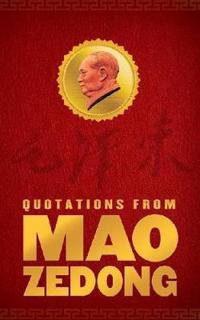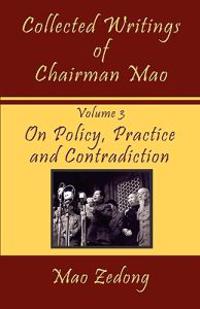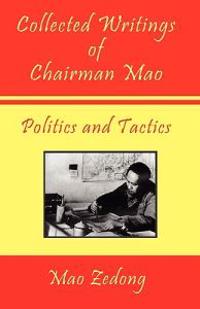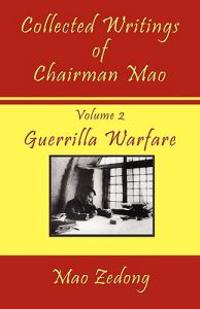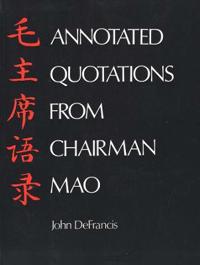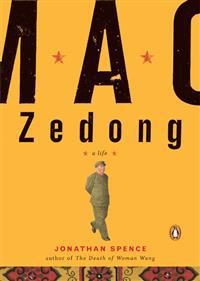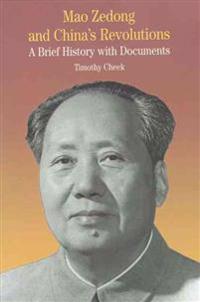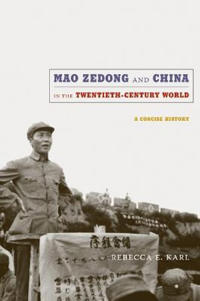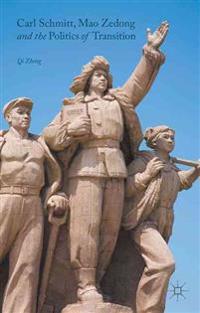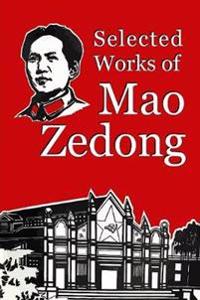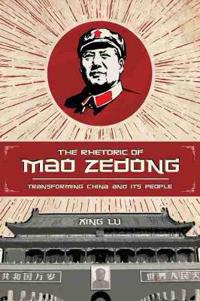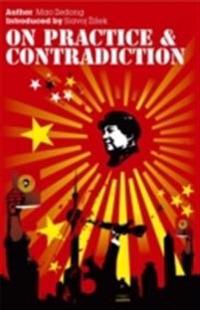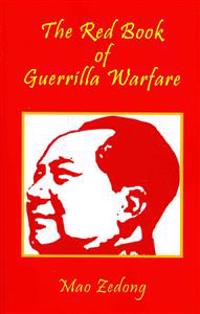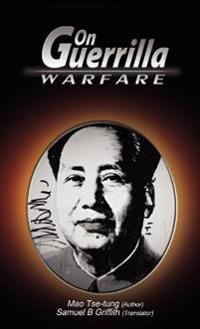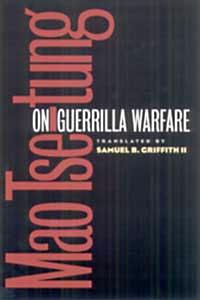Quotations from Mao Zedong (Häftad)
avZedong Mao, Mao Zedong
ISBN: 9781627740074 - UTGIVEN: 2013-08Poems of Mao Zedong, The: Translations, Introduction, and Notes by Willis Barnstone (Övrig)
avMao Zedong
ISBN: 9780520261624 - UTGIVEN: 2010-01-01Mao Zedong, leader of the revolution and absolute chairman of the People's Republic of China, was also a calligrapher and a poet of extraordinary grace and eloquent simplicity. The poems in this beautiful edition (from the 1963 Beijing edition), translated and introduced by Willis Barnstone, are exp[...]
Collected Writings of Chairman Mao: Volume 3 - On Policy, Practice and Contradiction (Häftad)
avMao Zedong, Mao Tse-Tung, Shawn Conners
ISBN: 9781934255247 - UTGIVEN: 200911Collected Writings of Chairman Mao - Politics and Tactics (Häftad)
avMao Zedong, Mao Tse-Tung, Shawn Conners
ISBN: 9781934255254 - UTGIVEN: 200911Collected Writings of Chairman Mao: Volume 2 - Guerrilla Warfare (Häftad)
avMao Zedong, Mao Tse-Tung, Shawn Conners
ISBN: 9781934255261 - UTGIVEN: 200911Annotated Quotations from Chairman Mao (Häftad)
avZedong Mao
ISBN: 9780300018707 - UTGIVEN: 1975-01This volume provides the original Chinese text together with a complete pinyin transcription of the famous little red book of Mao Tse-tung's thoughts on a wide range of topics. The annotation includes regular characters, simplified forms, pinyin transcription, and English definitions. Structural n[...]
Mao Zedong: A Penguin Life (Häftad)
avJonathan D. Spence
ISBN: 9780143037729 - UTGIVEN: 200608A renowned expert on Chinese history turns his considerable talent and experience to the life of China's greatest modern leader--the enigmatic, mythologized, often maligned, and still-revered architect of Chinese Communism and the modern Chinese state. Reprint.[...]
Mao Zedong and China's Revolution (häftad)
ISBN: 9780312256265 - UTGIVEN: 2002-07Whether one views Mao Zedong as a hero or a demon, the "Great Helmsman" was, undoubtedly, a pivotal figure in the history of 20th-century China, a man whose life and writings provide a fascinating window on the Chinese experience from the 1920s onward. Part Mao biography, part historical overview of[...]
Mao Zedong: A Political and Intellectual Portrait (Inbunden)
avMaurice Meisner
ISBN: 9780745631066 - UTGIVEN: 2007-01-31Mao Zedong: A Political and Intellectual Portrait (Häftad)
avMaurice Meisner
ISBN: 9780745631073 - UTGIVEN: 2007-01-31Mao Zedong and China in the Twentieth-Century World (Pocket)
avRebecca E. Karl
ISBN: 9780822347958 - UTGIVEN: 2010-07Throughout this lively and concise historical account of Mao Zedong's life and thought, Rebecca E. Karl places the revolutionary leader's personal experiences, social visions and theory, military strategies, and developmental and foreign policies in a dynamic narrative of the Chinese revolution. She[...]
Carl Schmitt, Mao Zedong and the Politics of Transition
ISBN: 9781137466587 - UTGIVEN: 2015-10Carl Schmitt's political and legal theory has been subject to criticism by Chinese scholars. One of the criticisms is based on the judgment that there are uncomfortable similarities between Schmitt's and Mao's theories. Due to the similarities between Schmitt and Mao, many Chinese scholars argue tha[...]
Selected Works of Mao Zedong (häftad)
ISBN: 9781312143081 - UTGIVEN: 2014-04Mao Zedong (December 26, 1893 - September 9, 1976), was a Chinese Communist revolutionary and the founding father of the People's Republic of China, which he governed as Chairman of the Communist Party of China from its establishment in 1949 until his death in 1976. His Marxist-Leninist theories, mi[...]
World History Biographies: Mao Zedong: The Rebel Who Led a Revolution (Inbunden)
avFlora Geyer
ISBN: 9781426300622 - UTGIVEN: 2007-05Born in Southern China in 1893, this farmer's son would rule the world's most populous country. The young Mao Zedong grew up in a world desperate to break with the ancient rules of the Qing dynasty. Mao challenged convention early in life, and was expelled from school. He joined China's new Communis[...]
The Rhetoric of Mao Zedong
ISBN: 9781611177527 - UTGIVEN: 2017-05Mao Zedong fundamentally transformed China from a Confucian society characterized by hierarchy and harmony into a socialist state guided by communist ideologies of class struggle and radicalization. It was a transformation made possible largely by Mao's rhetorical ability to attract, persuade, and m[...]
Quotations From Mao Zedong
ISBN: 9781627740289 - UTGIVEN: 2015-06Commonly known in the West as the "e;Little Red Book"e;, Quotations of Mao Zedong contains a selection from Mao Zedong's political statements and speeches. From 1964 to 1976, Quotations was published in nearly 50 editions, in Chinese and in 37 other languages, becoming one of the most-printe[...]
Come Inside My Head: Karl Marx, Fidel Castro, Mao Zedong, Joseph Stalin and More... (häftad)
ISBN: 9781723359392 - UTGIVEN: 2018-07On Practice and Contradiction (Häftad)
avMao Zedong
ISBN: 9781844675876 - UTGIVEN: 200701These early philosophical writings underpinned the Chinese revolutions and their clarion calls to insurrection remain some of the most stirring of all time. Drawing on a dizzying array of references from contemporary culture and politics, Zizek's firecracker commentary reaches unsettling conclusions[...]
The Red Book of Guerrilla Warfare (Häftad)
avMao Zedong, Shawn Conners
ISBN: 9781934255278 - UTGIVEN: 2010-01Mao Zedong: On Guerrilla Warfare (häftad)
ISBN: 9781979853231 - UTGIVEN: 2017-11On Guerrilla Warfare is Mao Zedong's case for the extensive use of an irregular form of warfare in which small groups of combatants use mobile military tactics in the forms of ambushes and raids to combat a larger and less mobile formal army. Mao wrote the book in 1937 to convince Chinese political [...]
Mao Zedong om filosofiska frågor
ISBN: 9789198317800 - UTGIVEN: 2016-03Varför ge ut en antologi med Mao Zedongs filosofiska texter? Är inte Mao Zedong död och begraven och hans tankar passé? Både Oktoberrevolutionen 1917 och det kinesiska folkets seger över den japanska imperialism och Guoumindang 1949 hade världshistorisk betydelse och skapade ett socialistiskt[...]
On Guerrilla Warfare (Pocket)
avZedong Mao, Mao Tse Tung, Zedong Mao
ISBN: 9780252068928 - UTGIVEN: 200010'One of the most influential documents of our time, Mao Tse-tung's pamphlet on guerrilla warfare has become the basic textbook for waging revolution in underdeveloped and emergent areas throughout the world. Recognizing the fundamental disparity between agrarian and urban societies, Mao advocated un[...]

